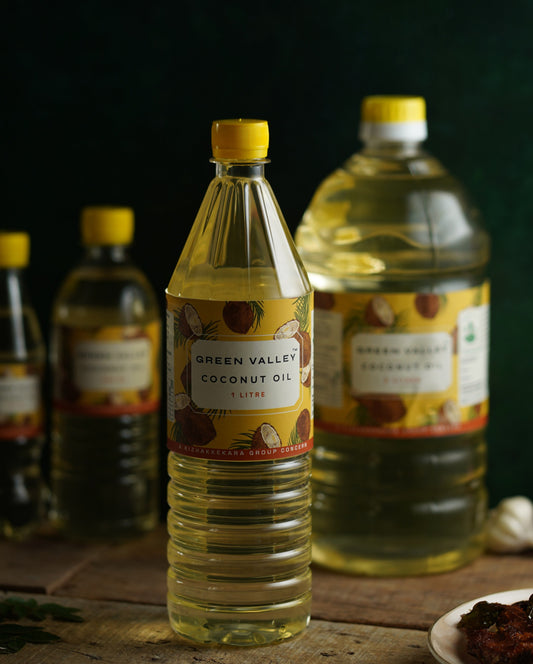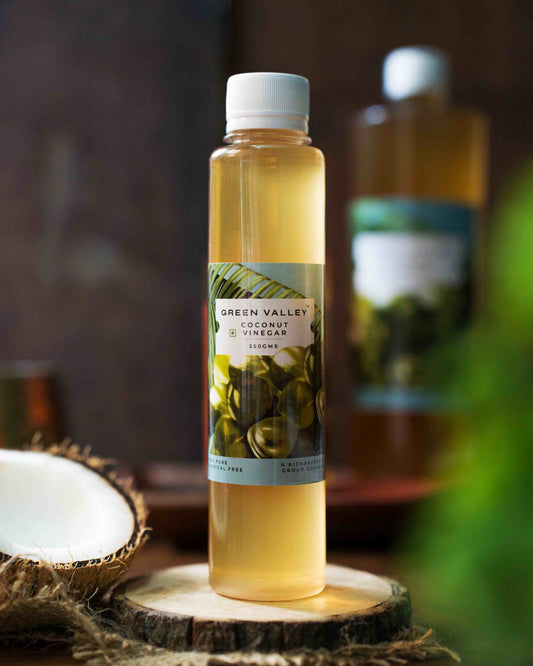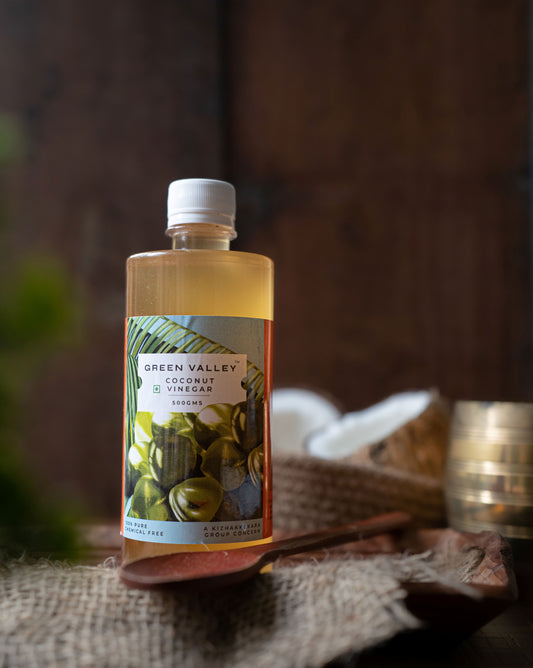The 2020s are not only the age of overload on content, but also overload on options on all fronts. And that includes vinegar. If you thought shopping for vinegar could be a 5-second job, you thought wrong. Even the smallest of supermarkets would have a minimum of three types of vinegar you can pick from. And with the crazy food scientists growing more enthusiastic and dedicated to their work, the numbers grow in size.
Not only have we surpassed the stage of making vinegar with sugarcane and primrose (yes, we live in a wild world), but there are infused vinegars which are a completely different topic altogether.
But today let’s focus on three vinegars that are widely available on the market and frequent contenders that might cause you a meltdown in the Vinegar aisle.
Each of these zippy liquids has its own special personality—whether it’s rice vinegar’s soft whispers of sweetness, apple cider vinegar’s tangy punch of fermented apples, or coconut vinegar’s tropical flair. But which one should you choose? It depends on your taste preferences, cooking needs, and nutritional goals. Let’s dive deep into the benefits, flavour profiles, and uses of rice vinegar, apple cider vinegar, and coconut vinegar to find out which is the reigning champ for your culinary (or health) needs.
The Flavours And The Complimentary Cuisines
Rice Vinegar
- Flavour Profile: Rice vinegar is often the mildest of the three, offering a subtle sweetness with a gentle tang. It’s typically made from fermented rice.
- Best For: Asian-inspired dishes, pickled veggies, salad dressings, and sushi rice. It adds acidity without overwhelming a dish’s natural flavours. Its mild flavour allows it to blend easily into dishes without being overpowering. It’s great for those who prefer gentle acidity.
Apple Cider Vinegar
- Flavour Profile: Apple cider vinegar is robust, tart, and packs a fruity punch with just a hint of apple flavour. It is made from fermented apple juice or cider.
- Best For: ACV is commonly used in health tonics, vinaigrettes, sauces, marinades, and soups. It can bring a bold, almost acidic kick to dishes. It’s also popular as a natural remedy and can be used for beauty applications, like hair rinses and skin toners.
Coconut Vinegar
- Flavour Profile: Coconut vinegar is slightly sweet and tangy with a mild tropical undertone. It’s made from either the sap of coconut blossoms or fermented coconut water.
- Best For: Coconut vinegar shines in Southeast Asian cooking, stir-fries, salad dressings, dips, sauces, and as a marinade. Its flavour is softer than apple cider vinegar but more pronounced than rice vinegar.
The Winner?
It’s a tie based on taste preference! If you want a mild, delicate tang, rice vinegar wins. If you prefer boldness, go for apple cider vinegar. For a more exotic, balanced option, coconut vinegar is your pick.
Health Benefits Comparison
Rice Vinegar
- Pros: Rice vinegar is low-calorie and has a subtle acidity, which can help with digestion. However, it lacks the more complex nutritional profile found in apple cider and coconut vinegar.
- Cons: It doesn’t offer as many antioxidants or vitamins as its competitors. In essence, rice vinegar is more of a culinary vinegar than a health tonic.
Apple Cider Vinegar
- Pros: Apple cider vinegar is lauded for its potential health benefits, including aiding weight loss, improving digestion, balancing blood sugar, and delivering antioxidants. Many of these benefits are attributed to its “mother” (a blend of bacteria and yeast).
- Cons: Its strong acidity may irritate sensitive stomachs or erode enamel when consumed in excess. Always dilute it if drinking!
Coconut Vinegar
- Pros: Coconut vinegar contains a range of vitamins, minerals (potassium, magnesium, iron), amino acids, and probiotics. Its low glycemic index makes it a favorite for those monitoring blood sugar levels. Its probiotic content supports gut health.
- Cons: It may not be as widely available as apple cider vinegar or rice vinegar and could be pricier depending on where you live.
The Winner?
For health benefits, apple cider vinegar and coconut vinegar take the lead, with coconut vinegar having a slight edge in nutrient density and probiotics. Rice vinegar, though milder, is primarily for flavour enhancement.
So, Which One is Better?
Better depends on your needs and taste buds! Here’s the breakdown:
- For everyday cooking and mild acidity, rice vinegar is the go-to.
- If you’re in it for health benefits and bold flavours, apple cider vinegar is your champion.
- For balanced flavour, tropical flair, and extra nutrients, coconut vinegar wins.
Ultimately, you can’t go wrong with any of these vinegars. Why not keep all three in your pantry and let your taste buds lead the way? After all, variety is the spice (or tang) of life!








